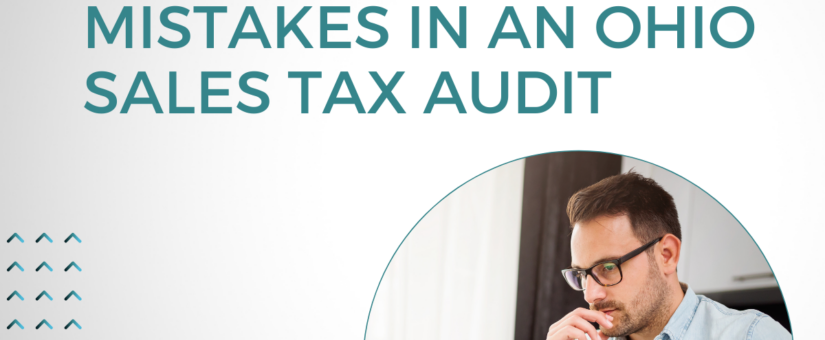
Ohio Sales Tax Audit Mistakes
- Posted by Joshua Sells
- On August 18, 2023
- audit, ohio audit, ohio sales tax, Ohio Tax Attorney, ohio tax debt, sales tax audit
Are you a small business owner in Ohio who has received notification that you are involved in an Ohio sales tax audit? Please don’t panic! Facing an audit can be daunting, but with the right knowledge and preparation, you can avoid costly mistakes and navigate the process smoothly.
In this ultimate guide, we will provide you with valuable insights, tips, and professional advice to help you successfully maneuver through an Ohio sales tax audit without breaking a sweat. So put your worries aside and let’s dive in!
The Importance of Sales Tax Compliance – Ohio sales tax audit
Before we jump into the ins and outs of an Ohio sales tax audit, it’s crucial to understand why sales tax compliance is so vital for your small business. Sales tax is a tax imposed by the state government on the sale of goods and certain services. As a small business owner, you are responsible for collecting and remitting sales tax to the appropriate authorities.
Failing to comply with Ohio’s sales tax regulations can be very costly for you. Not only with just the fines, penalties, and interest but also your business’s reputation is on the line as well. Therefore, it is essential to prioritize sales tax compliance from the very start to avoid any unnecessary headaches down the road.
Understanding Ohio Sales Tax Laws
If you find yourself struggling to successfully navigate an Ohio sales tax audit, you may need to set aside some time first to grasp the fundamental concepts and laws governing sales tax in Ohio. Let’s take a closer look at some key aspects:
Sales Tax Nexus
First and foremost, it’s crucial to understand the concept of “nexus.” Nexus refers to a business’s connection or presence in a particular state that triggers its obligation to collect and remit sales tax. In Ohio, nexus can be established through various factors, including physical presence, economic activities, or even through affiliates or subsidiaries. It is essential to determine whether your small business has nexus in Ohio to ensure proper compliance.
Even if you have no physical presence in the state of Ohio, you may still be required to collect and remit sales tax if you meet certain thresholds for gross receipts and transactions in the state of Ohio.
We recently had a call from a t-shirt vendor whose business was in AZ while he lived in California. Despite having no property or business presence in the state of Ohio, the state had initiated an Ohio sales tax audit because of the amount of business transactions in Ohio.
Taxable Goods and Services
Understanding what is subject to sales tax is equally important. In Ohio, most tangible personal property is subject to sales tax, including goods such as clothing, electronics, and furniture. There are exceptions to this. Certain goods, like groceries and prescription medications, are exempt from sales tax.
There are also select services that can be subject to sales tax as well such as towing and landscaping services (if the person providing the landscaping services does $5000 or more in sales). You can look at the Ohio Department of Taxation website to find out more about the goods and services that are subject to Ohio sales tax.
It is important that you have a good grasp of the basics of Ohio sales tax laws before you engage in business. We have received a number of calls from potential clients who started doing business in the state of Ohio under the assumption that they would not be subject to any sales tax only to find out later that they should have collected sales tax all along. This put them in a very difficult situation when they later found themselves involved in an Ohio sales tax audit.
One particular Ohio sales tax audit client had a number of transactions whose taxability depended on small details. Towing is a taxable service, but many ancillary services are not. Pulling someone out of a ditch is a taxable service, but a vehicle jump start is not.
This audit was further complicated by the fact that many of the charges originated in different counties with different sales tax effective rates. Diving into the tax code revealed that the taxability of each towing operation is determined by where the service originates.
These details apply to towing, but another whole set of ifs, ands, and maybes apply to each particular good or service being provided in the state of Ohio and you will be much better off in the case of an Ohio sales tax audit if you take the initiative to dive into these details sooner rather than later.
Strategies for a Smooth Sales Tax Audit Process
Now that you know some of the foundations of Ohio sales tax laws, let’s look at some strategies to help you navigate the sales tax audit process. By implementing these tips and best practices, you can minimize the risk of costly mistakes and ensure a successful outcome.
1. Organize Your Records
Maintaining accurate and organized records is crucial for a smooth audit experience. Make sure to keep detailed and up-to-date records of your sales, purchases, and all relevant documentation, such as invoices, receipts, and tax exemption certificates. Having a well-organized recordkeeping system will not only save you lots of time but also lots of headaches. Ohio Sales tax audits are all about documentation.
This cannot be overstated. Our representation is only as good as your documentation.
Sales tax auditors look very critically on handwritten records. They’re taking into consideration how difficult it would have been for you to doctor the records in your favor. For this reason we highly recommend digital point of sale systems where possible.
One of our clients recently underwent a multi-year Ohio sales tax audit. His lack of records undermined his credibility and ultimately his case, costing him a significant amount amount in taxes
As we dug into the records, it was clear to us that our client did not do close to the amount of business that the state had proposed he had done, but because he did not have effective and verifiably complete records, the state of Ohio was unconvinced that he did not have more cash sales that were not included in the documentation we provided.
Shortly after the audit was concluded, this client upgraded to a digital point of sale system that automatically records every transaction. He will be in a much better position should he ever encounter another Ohio sales tax audit.
2. Review your Sales Tax Returns
Before an audit begins it is important to go through your sales tax returns. Look for any potential discrepancies, errors, or omissions. Double-check that all sales and purchases have been accurately reported, and ensure that you have correctly applied any exemptions or deductions. This can avoid unnecessary penalties and show the auditor that you keep good records and being compliant with your tax filings is important to you..
3. Seek Professional Guidance
Navigating an Ohio sales tax audit can be complex and overwhelming, especially for small business owners who may not have extensive knowledge of tax laws.
Taking on an Ohio sales tax audit on your own can end up pulling your focus away from your valuable clients, ultimately costing you business that you cannot afford to lose!
Don’t underestimate the value of your time: Hire a professional that can free you up to focus on the core of your business that you know best!
Consider seeking professional advice from a tax attorney or a certified public accountant (CPA) who specializes in sales tax audits. Professionals can provide expert guidance, review and evaluate your records, and help you navigate the audit process with confidence. Remember that investing in professional assistance can save you from costly mistakes in the long run.
If you find yourself overwhelmed or unsure about any aspect of an Ohio sales tax audit, reach out to J. M. Sells Law, the Ohio sales tax audit experts, at 330-331-7611.
4. Communicate Clearly and Responsive
During the audit process, clear and open communication with the auditors is key. Don’t hide from them. Respond promptly to any inquiries or requests for documentation. If you don’t have the requested documentation, let the auditor know what similar documentation you do have that may answer their questions. Be cooperative, helpful, and honest in your interactions, providing the auditors with the information they need by the deadline. Remember that they are doing a job as well and want to move through the audit as quickly and smoothly as possible, much like you. Having a good attitude and being willing to work with the auditor will go a long way.
5. Understand Your Rights
As a small business owner, it’s crucial to understand your rights and obligations during an Ohio sales tax audit. Familiarize yourself with the Ohio Department of Taxation’s guidelines and procedures for audits. Be aware of your rights regarding confidentiality, appeals, and the timeframe for completing the audit. By knowing your rights, you can protect yourself and ensure that the audit process is conducted fairly and in compliance with the law. This is another aspect that a professional tax attorney can really bring value to your case. A tax attorney will make sure that the auditor is playing by the rules.
Conclusion
Facing an Ohio sales tax audit doesn’t have to be a nightmare. By staying informed, proactively maintaining accurate records, seeking professional guidance when needed, and communicating openly with auditors, you can navigate the process successfully and avoid costly mistakes.
Remember, sales tax compliance is a fundamental aspect of running a small business, and neglecting it can have severe consequences. Continue to educate yourself on Ohio sales tax laws, stay up-to-date with any changes or updates, and prioritize compliance from the start. If you owe the state of Ohio, check out our latest post on Ohio Tax collections.
If you find yourself overwhelmed or unsure about any aspect of an Ohio sales tax audit, reach out to J. M. Sells Law, the Ohio sales tax audit experts, at 330-331-7611.
Disclaimer: This blog post is for informational purposes only and should not be considered as legal, financial, or tax advice. Consult with a qualified professional for personalized assistance.

